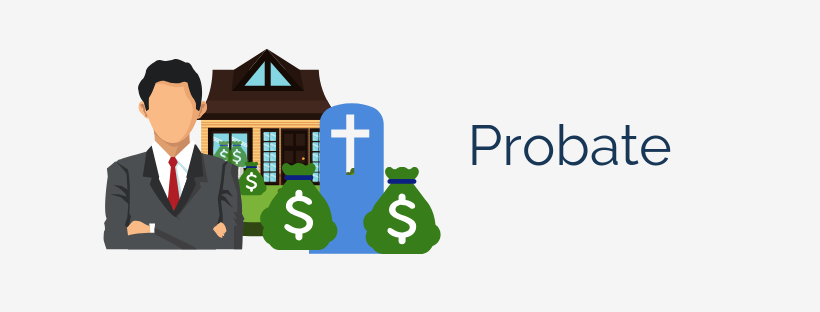What Is Probate?
When a person dies, a complex legal process is set into motion.
This process is known as probate. The word probate literally means “proving,” and the basic purpose of probate is to prove that a will is valid, settle any outstanding financial obligations of the decedent, and distribute the remaining assets to the decedent’s beneficiaries according to the provisions of their will.
However, probate will occur even if there is no will. In the absence of a will, the decedent’s assets will be distributed according to the rules of intestate succession. Intestate succession typically stipulates that a person’s assets go to their relatives, starting with their spouse and children, and moving on to more distant relatives if there are no immediate family members left alive.
There is only one way to avoid probate entirely, and this is to place your assets in a revocable trust before you die. Since probate is a long, complicated, and public process, there are numerous benefits to avoiding it, and that is why we encourage clients to set up a trust.
There is an entire probate court system, which is designed to oversee probate cases. For the players in probate court, these steps are a routine matter. For ordinary people, however, they can be somewhat daunting.

The Role of the Executor
Who is the most important player in the probate process?
Some people might say that it’s the decedent, or the person who left behind the estate. But the decedent, once he or she is dead, has no direct say in anything.
Instead, the person who plays the most important and the most direct role in the probate process is the executor, or the person who is tasked with managing the decedent’s estate during probate.
Executors have a wide array of duties. He or she are the one directly responsible for fulfilling the provisions of the will and managing the logistical complications associated with the decedent’s estate. The probate court itself only oversees this process; the executor is the one who must actually do the legwork.
The executor has a fiduciary duty to all of the beneficiaries. They must act in the beneficiaries’ interest and place this interest above their own. If they do not do this, but instead use their role as an executor as an opportunity to enrich themselves at the expense of the beneficiaries, then probate court can hold them financially liable (more on that below).
Being an executor is a difficult job. If you have been named an executor in a will, then you have the right to decline, and you should consider your options carefully before accepting the role. Being an executor means dealing with all sorts of complicated financial questions, and the entire process will likely take several months to several years.
However, being an executor can be a way of honoring your deceased loved ones, and many people who take on the role of executor are glad that they did. If you are a beneficiary as well as an executor, then it may also be in your interest to have a say in handling the assets you are set to inherit. Furthermore, you may receive a stipend for fulfilling your duties as executor, although the amount will vary.
What if there is no will? Someone will still be tasked with handling the distribution of the decedent’s estate, but they will instead be known as an administrator. Despite the name change, the role of the administrator is fundamentally the same as that of the executor.
The Uniform Probate Code
Probate is a matter of state rather than federal law. As a result, the probate system will vary from state to state.
As a result, your experience of probate will vary depending on what jurisdiction you find yourself in. Still, the basic process has many similarities across the board, and in this article, we will provide you with a brief overview.
The Steps of Probate

Step 1: File a Petition with the Probate Court.
If you wish to be the executor of a will, then you will first need to file the will and the decedent’s death certificate with the probate court, along with a petition for probate. You must also file a petition to be named executor.
You might think that, if you were named executor in the will, this will happen automatically, but in fact you will need to be officially appointed by the court before you can be an executor. Typically, the appointment process is a formality, but in some jurisdictions, you may be denied executorship if you are a convicted felon. Certain restrictions may also apply if you live out of state.
Step 2: Inform the Heirs and Beneficiaries.
After the will has been submitted, the probate court will hold a hearing to confirm that the will is valid. This is the “proving” part of probate.
As the executor, you have a duty to give notice to all of the beneficiaries and heirs. There is a small but important distinction between these two groups: beneficiaries are all the people named in the will and who stand to inherit the estate, while heirs are all the immediate relatives of the decedent who would stand to inherit via intestate succession if there was no will.
You must make every attempt to contact each member of both of these classes of people and inform them of the decedent’s death as well as the date and time of the hearing. You may even be required to take out a newspaper advertisement informing the general public of the hearing.
This hearing will give all of the heirs and beneficiaries a chance to dispute either the will or your executorship. For instance, if one of them has a will that was written at a later date, then this is their chance to present it. If there are no objections, and the will you have submitted is verified as authentic, then the process will move forward.

Step 3: Post Bond.
As executor, you are required to post bond with the court. This bond will be kept for the duration of the probate process.
The purpose of the bond is to protect the heirs and beneficiaries. If you fail in your duties as executor and cause the heirs and beneficiaries to suffer some loss, whether as the result of negligence or outright malice, then the court will compensate them by taking part or all of your bond. If, however, you fulfill your duties as executor, then you will receive your bond back when probate is over.
Bond is standard, but it does not occur in all cases. The decedent may waive the requirement to post bond in his or her will, or the beneficiaries may collectively choose to waive the requirement. This is typically done when the executor and beneficiaries have a strong and trusting familial relationship.
The precise size of the bond will vary depending on the size of the estate. Posting bond can be an intimidating process, but so long as you fulfill your duties as an executor honestly and thoroughly, you will likely have nothing to worry about.

Step 4: Take Inventory of the Decedent’s Assets.
Once the court has authenticated the will, your first official step as executor will be to take a thorough inventory of all of the decedent’s assets. This includes real estate, personal property, bank accounts, stocks, bonds, and any other type of asset that the decedent owned.
This step can be surprisingly difficult, and will likely require a full review of the decedent’s taxes and other financial documents. Once you have figured out where all the assets are, you must then take them into your possession; this process, known as marshaling the assets, can also come with its own set of difficulties.
When the assets have all been located and brought into your possession, you must typically file the full inventory with the probate court. The court will then appoint an appraiser to give an estimate of what the assets are worth; this will generally be determined according to date of death value (i.e. what they were worth at fair market value the day the decedent died).
Step 5: Pay Expenses.
The decedent’s estate may face a number of different expenses, including taxes and various debts. These debts may even include funeral expenses and unpaid medical bills from the end of the decedent’s life. As executor, you must take care of all of these expenses before the heirs and beneficiaries can receive anything.
The two major taxes which you will likely have to concern yourself with are income and estate taxes. Generally, the returns for these must be filed within nine months of the decedent’s death.
With regards to unpaid debts, you must send notice to all of the decedent’s creditors. Once you have done this, they are free to submit their claims within four months, and you may accept or contest these claims based on whether you believe they are legitimate.
You may be required to submit a list of expenses, and which debts you chose to accept and contest, to the probate court as well. If there is not enough money in the estate to pay the debts and taxes, then you may also need to liquidate some of the assets.

Step 6: Manage the Estate.
While the property in the decedent’s estate is still going through probate, you have a duty to manage it properly. For instance, if there is real estate which is rented out to tenants, then you must collect the rent. If there are cash assets, then you must invest those cash assets in an account where they will earn interest. If there is a motor vehicle, then it must be kept in working order.
While the estate is under your care, you are not allowed to take any unnecessary risks. Legally, you are required to act as a reasonably prudent person would. This means that you cannot invest the money in a high-risk venture, and if the money is already invested in such, then you must take it out and invest it somewhere safer.
In addition, there will be a lot of little tasks you will need to do in order to set the decedent’s affairs in order, such as canceling credit cards and informing relevant entities that the decedent has died. Take care to ensure that all of these are completed.
Step 7: Distribute the Estate.
Once all of the tax and debt obligations have been settled, then it will be time to distribute the assets within the estate in accordance with the will.
This involves the transferring of titles to the heirs and beneficiaries. It is typically the last step, but under some circumstances (particularly if the trust is large and the debts are small), you may be able to distribute some of the property to the beneficiaries earlier in the process.
The distribution process will commence with the court’s approval. It will likely necessitate that you submit a final accounting to the probate court, with all of the distribution and expenses taken into account.
There may be a few complications at this stage as well, particularly if there are minors involved. In this circumstance, you may need to create a trust to hold the assets for minors until they turn 18.
The Bottom Line
Probate is a complex and involved process, which is why we recommend that you arrange for your beneficiaries to avoid it by creating an estate plan which both a will and a revocable living trust. This has the added advantage of keeping your assets private: since probate involves court proceedings, it is necessarily open to the public, and anyone can see the details of your finances after you die.
With careful planning and good legal help, many problems can be foreseen and prepared for ahead of time. Due to the complicated nature associated with probate, it is always recommended to hire a competent, experienced probate attorney.
Probate is hard. But with the right legal representation, it is more than manageable.


